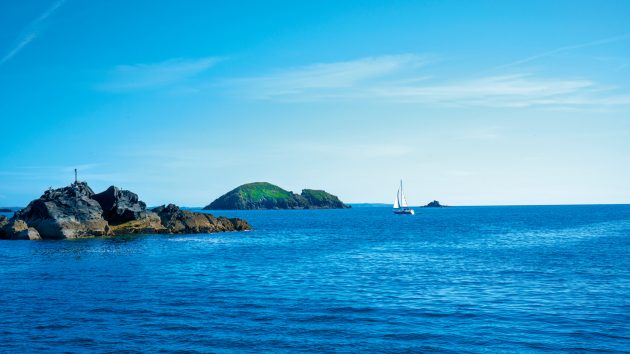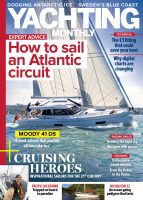Despite having cruised many far-flung destinations, Lou Luddington and husband Tom haven’t witnessed anything to rival the rich variety of sailing and marine wildlife offered by Pembrokeshire’s islands
Setting off from our swinging mooring at Rudders boatyard, Burton, in Pembrokeshire, we have to travel the length of the Cleddau estuary to reach open water. With the wind and tide in our favour we get whooshed along towards our destination, northwest of the mouth of the Milford Haven waterway. It’s an impressive stretch of water; a deep, wide natural ria that is home to the second-largest port in the UK.
As we sail past oil and gas tankers parked up at the refinery berths, we are dwarfed by their immense proportions; 200m long and several storeys high they create a wind shadow that brings us to a near standstill. Holding our nerve, momentum carries us their length and we drift back into the wind as the sails fill and we’re off again.
We know to stay alert to incoming tankers and the Ireland ferry, both of which have priority in the main channel and can appear at speed. After a two-phase renovation of our Westwind 35, Noctiluca, we are new to liveaboard life and in ‘shake down’ sailing mode to prepare for our grand voyage south to France, Spain, Portugal and the Canary Islands and beyond – an open-ended adventure that will take us far from home in the coming years.

Dr Lou Luddington is a nature photographer and writer with a PhD in marine biology. Photo: Dr Lou Luddington
Diving into another world
Our plan for the next few days is to sail north to our previous home village of Solva. Here we aim to meet up with family then join our friends who have their own yacht for a night at anchor, before sailing back to our swinging mooring the next day. Our passage plan will take us through Jack Sound and Ramsey Sound – two of the most notorious and fast-flowing stretches of water in Wales.
As we reach the mouth of the Haven we are set free from its confines. The water beneath us takes on a more lively motion and I dash below to secure locker doors and loose items as we begin to heel on a broad reach for Skokholm and Skomer Islands. We’re island bound!
Our route rounds the turbulent St Ann’s Head, passes Marloes Sands and Marloes Peninsula and navigates Jack Sound with its hidden rocks and frisky water.

Lou’s husband Tom takes command. Photo: Dr Lou Luddington
With calm seas and a flooding tide we are granted a smooth passage north. Our first stop is a tiny group of islands to the east of Skomer island and close to the mainland called the ‘Hen and Chicks’ (or Stack Rocks).
Approaching from the southwest we drop the anchor close to shore so that we can swim into the rocks for freediving. We’re alone but for one small motor boat pottering to-and-fro with a pair of anglers aboard.
Despite being a popular dive site, this is unexplored territory for us. Arriving in Noctiluca as liveaboard sailors and diving over the side not knowing what we’ll find, gives us a taste of the big adventure to come. Underwater we glide among golden stands of kelp and thongweed glittering with plankton and comb jellies, and delight in a visit from a curious seal that peeps around the seaweed at us. Climbing back up the ladder feels like we’re already living the dream.

Lou jumps in the dinghy to get a closer look at the marine life. Photo: Dr Lou Luddington
Sundowners with friends
After a quick change and some late lunch we lift anchor and continue our journey to Solva and a planned rendezvous with family and friends. Here we anchor in a deep pool at the mouth of Solva harbour and row ashore in our tender for a swift catch up with family.
They are excited to see us arrive by sea and wave us off again as we head back to Noctiluca to await our sailing friends Jetske and Paul who have their boat moored in the harbour. They soon appear and we sail a few miles west together on a dying wind. When the sails begin to droop we fire up the engines and motor into the quiet anchorage of Porthlysgi Bay for the night where there’s just enough room for two boats abreast.
Rowing over to join them aboard for sundowners, our surroundings are of ancient, craggy rock, bird sounds and a soft breeze of clean, salty air. We marvel at a pair of ravens soaring overhead, as they take turns to flip upside down in their bold aerial display and acknowledge how grateful we are for such a spectacular backyard.

A serene sunset unfolds as Lou is on watch. Photo: Dr Lou Luddington
The next morning I rise early and head up to the cockpit to greet the day. Glancing across to the neighbours I see Jetske climbing down the stern ladder for a morning dip, closely followed by her naked husband launching flamboyantly from the cockpit over the side rails; without hesitation. Tom joins in too, so that soon we’re all bathing in the cool waters, before the coffee has even brewed.
After waving farewell to our friends, the itinerary for the day is to complete the island tour by sailing north through Ramsey Sound then loop out west to the Bishops and Clerks, and back south to Skomer Island with the ebbing tide.
Noctiluca performs excellently in challenging seas; with her heavy full keel and both mainsail and genoa fully unfurled and set, we speed through the Bishops and Clerks at nine knots, whisked along by the tide. The tidal overfalls west of Ramsey Island are magnificent with flows reaching 15 knots between the other smaller islands on spring tides as the bathymetry squeezes and accelerates the water.
It’s a boisterous ride until we clear the islands then set a close hauled course for Jack Sound, 10 miles to the south.

The idea for the voyage was born during an earlier trip to Skomer with friends, aboard their BACO Sarum 28, Intruder. Photo: Dr Lou Luddington
Superlative sound
As we approach Jack Sound conditions are perfect and we hold our line for a passage under sail. Despite its perilous reputation we are confident in our local knowledge from my days working as a marine biologist in the Skomer Marine Conservation Zone.
It’s still a huge buzz as we power through the sound under sail and retrace our journey back along the Cleddau estuary. Reaching our mooring at Burton, we pick up the buoy as we drop the sails, no motor required. Our fantastic tour of the islands fires us up for the adventure to come!
The grand idea for an extended, liveaboard voyage was partly conceived on a trip with Jetske and Paul two years earlier aboard their 1977 BACO Sarum 28, Intruder, bound for Skomer Island. Heading due south for a distance of 10 miles across St Brides Bay, and with no tidal streams to consider, it was an easy journey to plan.
Light winds meant we could cruise in comfort and enjoy sightings of gannets plunge-diving, a pod of common dolphins travelling with purpose, and guillemots and razorbills upending to the deep in pursuit of fish.
Cruising into North Haven we picked up one of the three moorings provided by Natural Resources Wales for visitors, to prevent anchoring in the sensitive seagrass meadows.

Rafts of puffins bob in the swell off Skomer Island. Photo: Dr Lou Luddington
Designated as a Marine Nature Reserve in 1990, the 1,400 hectares of seabed around Skomer Island and Marloes Peninsula became a Marine Conservation Zone in 2014 – the only one in Wales.
Skomer is the largest of the Pembrokeshire islands and is a National Nature Reserve of international importance for seabirds managed by the Wildlife Trust of South and West Wales.
With around 42,000 puffins, 31,000 guillemots and 10,000 razorbills, the air and water is a riot of seabirds during the summer months that have returned to the island to breed. Many puffins stand on the grassy banks beside their nest holes in the ground in which they lay a single egg, whilst the surrounding cliffs jostle with guillemots.
Squeezed together in breeding colonies, each guillemot claims just the space beneath its feet to lay a single egg and raise the chick. Their close proximity brings safety in numbers and a battalion of pointy beaks to fend off marauding predators. It also means many scuffling feet to knock off precious eggs if the birds get disturbed and panicked by humans getting too close.

Puffins are better at swimming than flying. Photo: Dr Lou Luddington
Robust wildlife protection
The Pembrokeshire Marine Code protects seabirds and other wildlife through seasonal access restrictions to certain sensitive areas of the coast and provides guidelines to minimise disturbance. In North Haven, for example, the large guillemot breeding colony on the east side of the bay must be given a wide berth of at least 50m, as with other cliffs.
Similarly, access to the beach in the far south-east corner is forbidden to avoid disturbance of resting and breeding Atlantic grey seals. Details of the Marine Code and maps showing restricted areas are available for all of the Pembrokeshire islands via the Pembrokeshire Marine Code website, where you can download the Wild Seas Wales app for easy access.

Curiosity gets the better of a grey seal. Photo: Dr Lou Luddington
The Code protects nesting seabirds between April and the end of July after which they return to a life at sea, and breeding grey seals between July and the end of November when they come ashore to raise their pups and breed.
The Code also gives general advice about how to enjoy wildlife as a mindful skipper by tempering your speed and keeping your distance. North Haven is a wonderful place to sit and enjoy the spectacle of birds going about their busy lives, whirring overhead on wings better suited to swimming and diving than flying.
We considered landing at the harbour and walking the incline for an exploration of the island but we opted for a snorkel over the seagrass meadow instead. Drifting near to rafts of puffins, we would catch sight of them zipping beneath us in pursuit of sand eels, sheened with air and flashing in the sunlight as though gilded in mercury.

Sunset over Skokholm Island on the return to Milford Haven aboard Noctiluca. Photo: Dr Lou Luddington
After lunch we took time to just sit and observe the bustle of nature in full swing. Cruising home across the bay at the pace of the wind awakened us gently from the Skomer dream. For Tom and I, a seed had been planted for an adventure on the high seas and a chapter living by the sway of the ocean.
Not long after, we made the decision to sell our house, buy a sailing boat and disappear across the Atlantic for a few years. Having now explored Europe, the Canary Islands and the Caribbean, Pembrokeshire remains our firm favourite for exciting sailing, rich wildlife and that magical sense of home. With careful planning you can enjoy the best the British Isles has to offer – secluded anchorages and incredible wildlife all crammed into this corner of Pembrokeshire.
Enjoyed reading this?
A subscription to Yachting Monthly magazine costs around 40% less than the cover price.
Print and digital editions are available through Magazines Direct – where you can also find the latest deals.
YM is packed with information to help you get the most from your time on the water.
-
-
- Take your seamanship to the next level with tips, advice and skills from our experts
- Impartial in-depth reviews of the latest yachts and equipment
- Cruising guides to help you reach those dream destinations
-
Follow us on Facebook, Twitter and Instagram.





